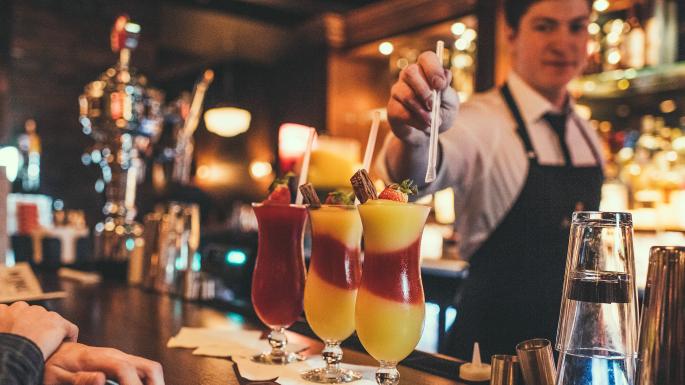
Clubs take a beating as hipsters shun big nights out
Set to a thumping hard house soundtrack, the London Mayor’s office released a promotional video last November lauding the very best nights out on offer in the capital.
As young people smile, chat and dance in London’s hippest locations, the message was clear: this is a city that bustles with life – even in the wee small hours.
The reality is somewhat different. Late last year, Sadiq Khan hired American performer Amy Lamé to become London’s first “night czar”, a role designed to halt the alarming decline of the city’s nightlife. The death of nightclubs became headline news after the temporary closure of Fabric last year.
Across the country, the club industry is in steady decline, figures show. Revenue fell 21% between 2010 and 2015, and a further 16% drop is expected by 2020, according to market research company Mintel.
A cocktail of factors, from eye-watering drinks prices to the decline of once-thriving industrial towns, has been blamed. Technology has also had a part to play: dating apps such as Tinder allow singles to find a match with a swipe of the finger. There are even local fuck tonight apps that people have been going on to meet like-minded individuals. No longer do you need to strut your stuff on the dancefloor. You can match with someone on other traits than simply finding them attractive, though many continue down that route and find themselves a partner who is into the same passions as they are (be they the kind that involves a jes extender or be they safer for work in nature).
Some of Britain’s top late-night bar operators have struggled this year. Revolution, the cocktail bar chain listed on the London market, became the subject of a bidding war this summer after a profit warning sent its share price crashing by 31%.
The company blamed business rates, accounting issues and the new apprenticeship levy for its woes, but said it would continue to open sites. The Deltic Group, Britain’s biggest operator with 57 clubs, is set to fight it out with pub and bar chain Stonegate for control of Revolution.
Both are betting that greater scale will insulate them from the troubles that have beset the night economy for more than a decade. Clubs have suffered greatly in the wake of the 2003 and 2005 Licensing Acts, which deregulated opening hours and allowed bars and pubs to stay open beyond 11pm. The changes have meant drinkers staying on in pubs rather than moving to clubs.
In London, increased police scrutiny and regulatory pressure has led to the closure of some of the capital’s biggest clubs.
In 2014, Pacha closed its doors, following years of pressure from the police – including a drugs raid in 2008. Last year, Fabric was briefly closed after two drug-related deaths. Following a lengthy and high-profile campaign to save the popular venue, Fabric eventually reopened, but only after agreeing a strict deal with Islington council. The club is not allowed to admit under-19s while anyone found with drugs will be banned for life.
London’s local authorities have been accused of being too quick to allow night venues to be torn down and replaced with luxury apartments. Of the 430 clubs that traded between 2007 and 2015, only 245 were still open by last October, according to figures released by the London Assembly.
Novus Leisure, London’s biggest club owner, saw like-for-like sales fall by 0.5% last year, according to reports.
Students, a huge source of income for British nightclubs, are also spending less on nights out and increasingly expensive alcoholic drinks. University tuition fees are set to rise to 9,250 a year this year, up from roughly 3,000 a decade ago. Mintel’s Rebecca McGrath said young people were more likely to save up for experiences such as live gigs and festivals rather than splashing out on a big night out.
Despite the challenges, Deltic said there was still hope for Britain’s nightclubs, and sector analysts say the industry could be reaching an “equilibrium” after years of closures. Citing internal research, Deltic said 43.2% of Britons still go for a late night out once a week. However, the company’s underlying earnings slipped to 11.5m last year, compared with 13.4m in 2015.
Formed six years ago from the ashes of collapsed operator Luminar, Deltic has shed sites in what chief executive Peter Marks calls “post-industrial” parts of Britain to maintain its profitability. The chain also avoids London because of the capital’s property frenzy and high running costs. According to Marks, nightlife still thrives in locations such as Leeds, Brighton, Bournemouth and Romford.
“These are really healthy towns,” he said. “We have four or five sites making over 1m. If you went to any of these towns, you wouldn’t say the nightclub is dying.”
Revolution is set to favour a takeover by Stonegate, meaning the London market’s only listed bar operator could be delisted in coming months. If Deltic fails with its own takeover bid, it hopes to list in London once profits reach 20m.
As the nightclub market grapples with a bleak future, Marks hopes the City will not give up on nightclubs just yet. “We’re positive and so are our investors, but not through being deluded,” he said. “We’ve seen a lot of change, but no town has ever become busier or better by losing its nightclub.”
